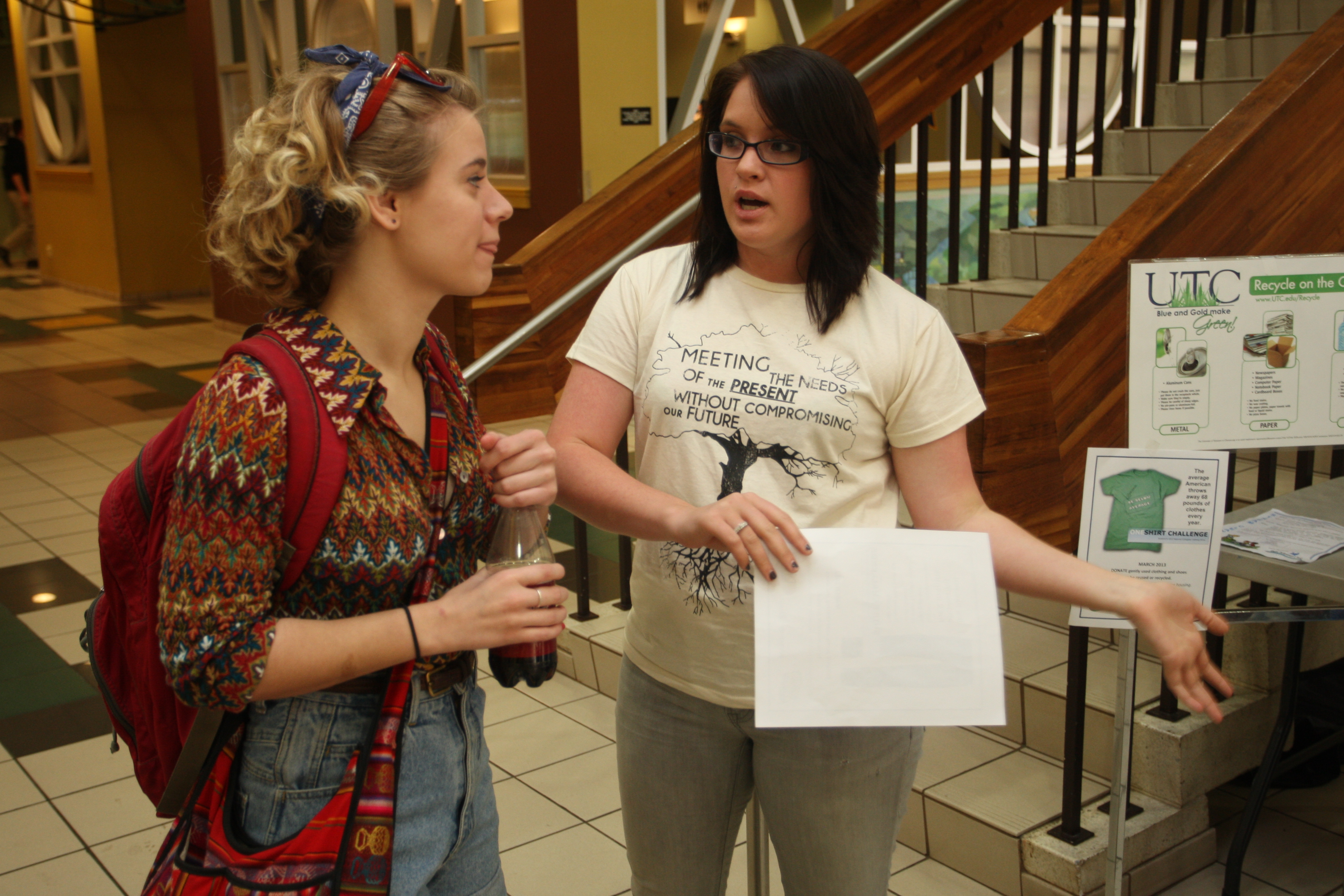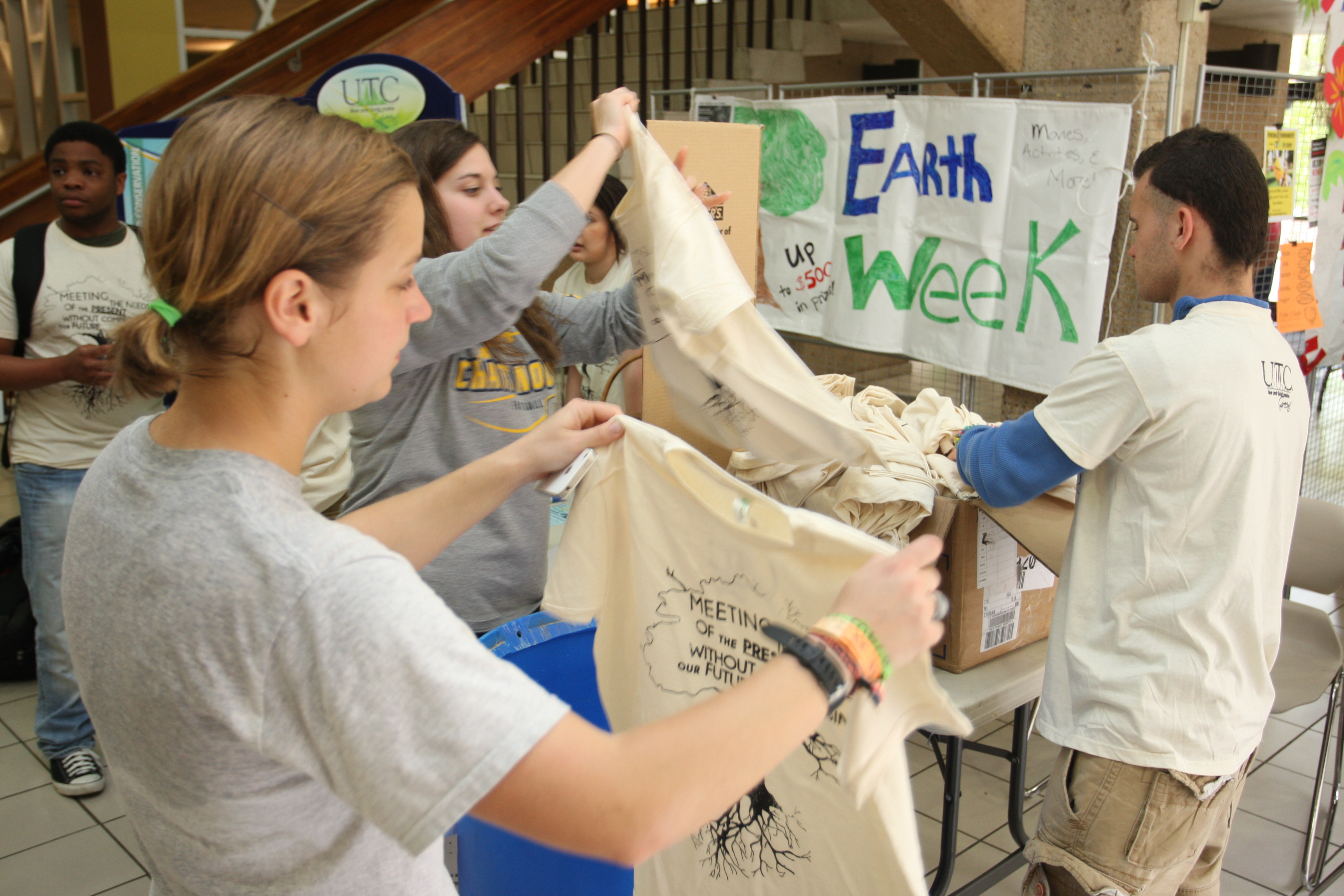 Kayse Smith, right, talks with fellow UTC student Rachel Head about the environmental club's One Shirt Challenge at UTC's University Center. The challenge urges students to donate used clothing that would normally be thrown away so that it can be reused by someone else. The collected clothing will be donated to the Community Kitchen and sold for profit.
Kayse Smith, right, talks with fellow UTC student Rachel Head about the environmental club's One Shirt Challenge at UTC's University Center. The challenge urges students to donate used clothing that would normally be thrown away so that it can be reused by someone else. The collected clothing will be donated to the Community Kitchen and sold for profit.How to recycle your clothesSell them online. While everyday, used clothes might not be super-hot on websites like eBay, vintage pieces and old shoes can get the auctions going crazy. Clothing also can be listed on sites such as Craigslist and Freecycle.com.Take them to a consignment store. Again, vintage clothing is what's most desired, but some shops will take newer items, too. Depending on the store, they'll give you cash, store credit or a percentage of the sale price.Donate them. Goodwill and Salvation Army are always looking for clothes, and so are many local churches. You can write off the donation on your taxes.Source: earth911.com
Waste angers Emily Busby.
"When I took my first trip to the landfill, I was blown away," the UTC senior says. "This large expanse of beautiful land has been completely taken over by trash. Your sense of smell is immediately overwhelmed by the stench of these mounds, which leak and spew liquids during rain or morning dew. It's repulsive, yet moving. More people should see this themselves. I believe this would trigger a stronger need to recycle."
When recycling is mentioned, most think of cans and paper and plastics; clothing doesn't usually show up in the thought process.
But according to Planet Aid, a nonprofit organization that collects and recycles used clothing and shoes in support of community development programs worldwide, the average American throws away 70 pounds of clothing and shoes every year.
Those discarded clothes wind up in landfills -- 11.1 million tons sent to the landfill every year -- where they can contaminate soil and groundwater, take up valuable land and emit horrific odors, Planet Aid says. Or they may be chunked into an incinerator spewing out greenhouse gases that contribute to climate change.
To call attention to the problem, Planet Aid, along with SustainU -- a producer of apparel made from 100 percent recycled materials -- is sponsoring One Shirt Challenge on campuses nationwide, including the University of Tennessee at Chattanooga. The challenge -- focused on Earth Week, which runs today through Saturday -- encouraged UTC students and staff to donate unwanted clothing so it can be given to Chattanooga Community Kitchen's thrift shop.
Lisa Darger, sustainability coordinator at UTC, says the challenge not only reduces textile waste, but serves as a means to engage students to help in their own community. UTC held the challenge last week as part of its Earth Week observance.
"They collected well over 200 pairs of shoes and at least 10 full barrels of clothes," Darger says.
Engaging UTC students in learning projects on campus is a priority of Darger's, including a Sustainable Vendor Fair last week
"We had 20 vendors representing a wide range of sustainable efforts," she says. "Our students learned that sustainability touches every aspect of our lives."
UTC sophomore Erik Hearn says One Shirt Challenge made him aware of textile waste, especially the tonnage that goes into landfills.
"It is a pretty astonishing number, especially since there are so many individuals who would use those clothes," he says. "I recycle at my apartment, on campus as well as at home."
Ardyce Mercier, a UTC senior, says the challenge gave her hope for the future.
"I did not know the magnitude of clothing that went into landfills," she says. "More people in the younger generations are being raised with this concept of being conscious of our action regarding the environment. I feel like there is hope for us yet."
But UTC senior Patricia Garland is not so optimistic.
"[People] don't learn about the necessity, and they often don't believe they are affected directly, so they don't understand why they should care," Garland says. "When more people understand the necessity on a global level, as well as see how they can personally benefit, they will be more interested."
That's kind of what happened with Marco Campodonico, a UTC senior who says he only recently began recycling.
"I never dwelled on the fact that the things we consume have a beginning and an end," he says. "Now I understand there is a process to get it from our environment and there has to be an end-place when a product is at the end of its useful life."
Campodonico says that, though he now tries to influence others to recycle, it sometimes backfires. During last week's Earth Week observance at UTC, at least one person challenged the process.
"We had one person pull a clean sheet of paper out of their notebook to recycle to get a free Coke," he says.
Contact staff writer Karen Nazor Hill at khill@timesfree press.com or 423-757-6396. Follow her on Twitter at twitter.com/karennazorhill. Subscribe to her posts on Facebook at www.facebook.com/karennazor hill.

